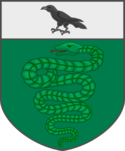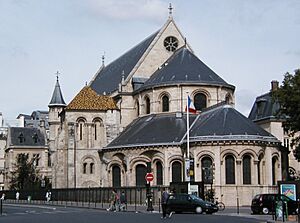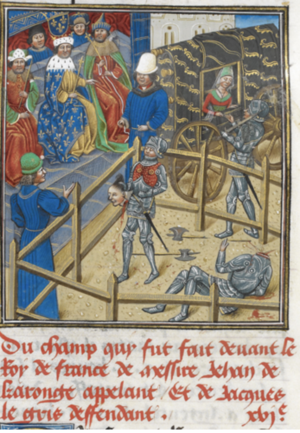Jacques le Gris facts for kids
Quick facts for kids
Sir Jacques le Gris
|
|
|---|---|

The coat of arms attributed to Sir Jacques le Gris in The Last Duel, based on a coat of arms used by descendant Guiliaume le Gris du Clos in 1696.
|
|
| Born | c. 1330s Normandy, France |
| Died | 29 December 1386 (aged c. 56) Paris, France |
| Allegiance | |
| Years of service | 1370–1386 |
| Rank | Captain of Exmes |
| Battles/wars | Hundred Years' War |
| Awards | Lord of Aunou-le-Faucon |
Sir Jacques le Gris (meaning "the Gray") was a French squire and later a knight. He lived from around the 1330s until December 29, 1386. He became well-known, and sadly, was killed in one of the last judicial duels allowed by the French court. This duel happened after a serious dispute arose between him and Marguerite de Carrouges, the wife of his neighbor and rival, Sir Jean de Carrouges.
Jean de Carrouges took the matter to King Charles VI. After hearing both sides, the King approved a "trial by combat" to decide who was telling the truth. This duel drew thousands of people and has been written about by many famous French writers, from Jean Froissart to Voltaire.
Jacques le Gris was described as a strong and tall man. He was a loyal follower of Count Pierre d'Alençon and was well-liked at the Count's court. He managed a large part of the Count's lands, in addition to his own family's property. Le Gris chose to defend himself through a knightly trial by combat. He could have chosen a safer church trial, as he had some church training. His choice gained him much support among the French nobles.
Contents
Early Life of Jacques le Gris
Jacques le Gris was born in the 1330s. His father, Guillaume le Gris, was a minor Norman squire. Unlike many people at that time, Jacques was educated. He even took "minor orders" in the church, which meant he could read well enough to help with church services.
Like his father, Le Gris first served as a man-at-arms and then as a squire for the Count of Perche. He was very good at this job. He also fought in several small battles in Normandy, serving with Robert d'Alençon.
At some point, Le Gris got married and had several sons. His family line continued for many years.
In 1370, Le Gris was rewarded for his long service. He was given command of one of his lord's castles in the village of Exmes. During his career, he became good friends with Jean de Carrouges. Carrouges was another squire serving the same count. They were so close that in 1377, Carrouges made Le Gris the godfather to his oldest son. This was a very important and trusted role.
When Count Robert died in 1377, his brother, Pierre d'Alençon, became the new count. This changed the friendship between Le Gris and Carrouges. Le Gris was skilled, friendly, and smart. He quickly became one of the new count's favorite people. When Count Pierre moved his court to Argentan, Le Gris lent him a lot of money (3,000 livres). As a reward, he was confirmed as the Seigneur (Lord) of Exmes. He also received a valuable estate called Arnou-le-Faucon.
As Le Gris gained more favor with the count, Carrouges, who was poorer, often felt ignored. This made their friendship worse. The death of Carrouges' wife and son in 1380 also broke their family ties.
Soon after his family died, Carrouges went to fight in Upper Normandy. Meanwhile, Le Gris's reading and military skills helped him become more important in Count Pierre's court. He traveled with the count to Paris for business. During these trips, Count Pierre introduced Le Gris at the royal court. He also helped Le Gris get the important title of Royal Steward. This was a position in the household of the King, Charles VI.
Disputes and Reconciliation
In 1381, Le Gris and Carrouges had a public argument. It was about the land of Aunou-le-Faucon. Carrouges had returned from wars with a new wife, Marguerite de Thibouville. Her father had previously owned Aunou. Count Pierre had legally bought the land in 1377. But Carrouges wanted it back as part of his wife's dowry. He took Count Pierre to court to get it.
Count Pierre was very angry with Carrouges. He had to visit the King to get royal approval for his purchase. Carrouges became isolated from the court. He spent three years fighting legal battles over land with Count Pierre. Le Gris was deeply involved in these disputes. He was the Lord of Aunou-le-Faucon and an adviser to the count. Carrouges began to blame Le Gris for causing these lawsuits against him.
The two men made up in the winter of 1384. Carrouges and Le Gris were both invited to a friend's estate to celebrate the birth of his son. For the first time, Carrouges brought his wife Marguerite to a social event. It was at this party that she first met Le Gris. Despite their past arguments, Carrouges and Le Gris shook hands and drank together. They put their quarrel behind them in front of their friends and neighbors.
A few months later, Jean de Carrouges left for a war in Scotland in 1385. This was part of France's alliance with Scotland. Le Gris used this chance to gain more influence with Count Pierre. He made significant financial and land gains while his rival was away. Carrouges returned a year later. He was now a knight, but he was also broke, sick, and tired from a long, unsuccessful war. When Carrouges arrived at Argentan in January 1386, he had another confrontation with Le Gris. No one knows exactly what was said. But the two men parted ways on bad terms. Carrouges then left for Paris, very upset.
The Judicial Duel
The court faced confusing stories from both men. They could not decide who was right. So, on September 15, the court announced that the two men would fight to the death. This duel would happen on November 27, 1386, to decide the truth. If Carrouges lost, Marguerite would be punished for lying. King Charles VI was away fighting in Flanders. He ordered the duel to be moved to December 29. He did not want to miss what was becoming a very important event.
On the chosen day, Le Gris and Carrouges traveled through Paris. They went to the Abbey of Saint-Martin-des-Champs. The abbey's field had been changed from a jousting ground into a wooden arena just for the fight. It had raised areas for spectators and a special royal box. The King was there, along with his uncles and brother. Thousands of ordinary people from Paris, Normandy, and other parts of France also came to watch. The common people were warned to be quiet. Anyone who tried to help either fighter would be executed.
Legal records do not describe the fight itself. But writers from that time left several accounts of the battle. According to these stories, the two men entered the field last. Before everyone, they repeated their accusations against each other. They swore oaths that they were telling the truth before the King, the court, and God. Before they got back on their horses, the marshal of the duel performed a short ceremony. He knighted Jacques Le Gris. This ceremony was traditional before such battles. It also helped keep the social order of medieval France. With both men at the same social rank, no higher-ranking person would be defeated by a lower one. After becoming a knight, Sir Jacques got back on his horse, and the arena was cleared. Both knights wore heavy armor. They were protected by a shield made of hide and wood, showing their family crest. They rode strong warhorses. Each carried a lance, a longsword, a heavy battle axe, and a long dagger called a misericorde.
At the marshal's signal, silence fell over the field. Both knights spurred their horses and charged. Their lances hit each other's shields but did not cause much damage. They turned and struck again. This time, their lances hit their helmets but did not break through. They remained on their horses. For a third time, they turned and charged. Again, both lances struck. This time, the lances shattered. Pieces of wood flew across the arena, almost knocking both men off their horses.
They regained their balance. The knights then rode towards each other with their battle axes drawn. They traded fierce blows with both hands. As the fight continued, Le Gris's greater strength began to show. Carrouges was pushed back. Then, with a mighty swing, Le Gris's axe cut the spine of Carrouges's horse. The dying animal fell to the ground. Carrouges jumped clear. He met Le Gris's charge by stepping aside. This allowed him to thrust his own axe's sharp point deep into the stomach of Le Gris's horse.
| "Sir Jean de Carogne was, at the first onset, wounded in the thigh, which alarmed all his friends: notwithstanding this, he fought so desperately that he struck down his adversary, and, thrusting his sword through the body, caused instant death; when he demanded of the spectators if he had done his duty: they replied that he had. The body of Jacques le Gris was delivered to the hangman, who dragged it to Montfaucon, and there hanged it." |
| Froissart's Chronicles, Book III, Chapter 46. |
As his horse stumbled and fell, Le Gris was thrown off. He lost his axe. Without fear, he stood up and drew his longsword. He turned to face Carrouges, who was already coming towards him, also with his sword drawn. Again, the fighters exchanged blows. Their weapons were the only sounds heard in the silent arena. Again, Le Gris's greater strength gave him an advantage. He pushed Carrouges back. Then he thrust his blade through his opponent's thigh. The crowd murmured. Le Gris made a big mistake. He pulled out his weapon and stepped back to watch his wounded enemy. This left him off balance. The desperate Carrouges threw himself forward. He wrestled Le Gris to the ground and hacked at him with his own longsword. Le Gris's plate armor was too thick for Carrouges's weapon to go through. But it was also so heavy that he could not get back on his feet with Carrouges on top of him.
Stuck on the ground, Le Gris struggled. Carrouges sat on top of him. He used his sword to smash open the lock on Le Gris's faceplate. The crowd watched in silence. Carrouges shouted into Le Gris's exposed face. He told him to confess his crime before he died or face Hell. Le Gris replied so everyone could hear, "In the name of God, and on the peril and damnation of my soul, I am innocent of the crime." Carrouges was furious. He drew his misericorde (dagger) and thrust it through Le Gris's throat, killing him instantly.
When Le Gris died, the crowd cheered. The King greeted the winner with several valuable gifts. Carrouges became a rich and famous man because of his victory. But even though he died, Le Gris was not forgotten. Right after the duel, the Executioner of Paris took charge of the body. He removed its armor and clothes. Then he dragged it through the streets to the Gibbet of Montfaucon. There, it was hung up next to the bodies of criminals to rot. Later, it was thrown into a common grave.
However, Jacques Le Gris's family and supporters kept his memory alive for many years. His son, Guillaume Le Gris, paid a lot of money (over 200 francs) for church services to be said for his father. He called him "a man of noble memory." He continued to pay similar amounts for at least ten years after his father's death. Count Pierre also remembered his adviser fondly. He took revenge by stopping Carrouges from buying more land or gaining more power in Normandy.
Legacy of the Duel
In the centuries since Le Gris's death, this case has become an important story in France. The duel was one of the last "trials by combat" ever allowed by the French court or the French Kings. Whether Le Gris was truly guilty or innocent has been a big topic of discussion among historians and legal experts.
The writer Jean Froissart, who lived at the same time, had no doubt that Le Gris was guilty. He saw him as a villain. Later writers had different views. These included the Grandes Chroniques de France and the works of Jehan de Waurin. They repeated a story, with different details, about an unknown person admitting their guilt after being sentenced to death for an unknown crime.
During the Age of Enlightenment, the duel was looked at again by Antoine-Gaspard Boucher d'Argis. He repeated the story of the anonymous criminal's confession in Diderot's Encyclopédie. Voltaire also wrote about it in his Histoire du Parlement de Paris. An imaginative version of the story was even in the Encyclopædia Britannica until the 1970s.
Legal studies done in the 2000s by French legal experts generally thought it was likely that Le Gris was the real culprit. This was based on Marguerite's evidence. However, none of them could prove it for sure. One major exception was a book written in 1890 by F. White Le Grix. He was a descendant of Le Gris and tried hard to defend his ancestor.
A book by Eric Jager about the duel was made into a movie. The film, also called The Last Duel, was directed by Ridley Scott and came out in 2021. In the movie, Adam Driver plays Jacques Le Gris.
 | Victor J. Glover |
 | Yvonne Cagle |
 | Jeanette Epps |
 | Bernard A. Harris Jr. |



